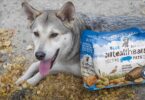If you’re wondering whether your furry friend can enjoy coconut, you’re not alone. Many pet owners are curious about this tropical fruit and its safety for their pets.
Generally, coconut is safe for dogs in small amounts. However, it’s important to approach this treat with care. Coconut can be a healthy addition to your dog’s diet when served in moderation.
Before feeding coconut to your pet, consider their overall diet and health. It’s crucial to monitor portion sizes and choose the right coconut products. Always consult with a veterinarian before making any changes to your dog’s meals.
This article will guide you through the essential safety tips and guidelines. We’ll explore the benefits and risks, helping you make informed decisions for your pet’s well-being.
Understanding Coconut Nutrition for Dogs
Coconut can be a nutritious addition to your dog’s diet when given in moderation. It offers several health benefits, but it’s important to understand its nutritional profile to ensure safe and healthy consumption.
Health Benefits of Coconut for Canines
Coconut contains lauric acid, a compound known for its immune-boosting properties. This makes it helpful in fighting off viruses and supporting your dog’s overall health. Additionally, coconut oil is renowned for enhancing a dog’s coat and paw health, contributing to their grooming and comfort.
Potential Risks and Precautions
While coconut can be beneficial, it’s high in saturated fats, which can lead to gastrointestinal upset if consumed excessively. It’s crucial to serve coconut in moderation and as a supplement to a balanced diet. Coconut meat and oil have different fat content, so understanding their roles is key to avoiding digestive issues.
For more information on safely introducing new foods to your dog’s diet, visit our guide on can dogs eat avocado.
Can Dogs Have Coconut? Exploring the Main Query
Many pet owners wonder if their canine companions can safely enjoy coconut. The answer lies in moderation and careful consideration of their overall health.
Moderation and Safety Guidelines
Coconut can be a healthy treat for dogs when served in small amounts. It’s important to limit coconut intake to no more than 10% of your dog’s daily calorie intake. For example, a small dog might enjoy a teaspoon of coconut oil per day, while larger breeds can have up to 1-2 tablespoons.
Coconut milk is another option, but it should be given in minimal amounts due to its fat content. Always choose unsweetened, unflavored varieties to avoid added sugars.
Introducing coconut gradually is key. Start with a tiny amount and monitor your dog’s reaction. If you notice any signs of discomfort, such as upset stomach or skin issues, stop immediately.
When to Consult a Veterinarian
Every dog is different, and what works for one may not work for another. If your dog shows signs of intolerance, such as vomiting or diarrhea, seek veterinary advice. Your vet can provide personalized recommendations based on your dog’s specific needs and health conditions.
Remember, coconut should never replace your dog’s regular meals. It’s best used as an occasional treat or supplement to a balanced diet. Always prioritize your dog’s health and consult a professional if you’re ever in doubt.
Different Coconut Products and Their Safety
Coconut comes in various forms, each with its own benefits and risks for dogs. Understanding these differences is key to ensuring your pet’s safety and health.
Coconut Meat and Shredded Coconut
Coconut meat and shredded coconut can be safe for dogs when unsweetened. They provide fiber and nutrients but should be given in small amounts to avoid digestive upset. Always choose unsweetened varieties to prevent added sugars.
Coconut Oil, Milk, and Water
Coconut oil is beneficial in small amounts, enhancing skin and coat health. However, excessive use can lead to diarrhea. Coconut water is a good source of electrolytes but should be fresh and free from additives. Coconut milk, while nutritious, should be given in moderation due to its high fat content.
When introducing coconut products to your dog, start with small amounts and monitor their reaction. If any signs of discomfort appear, discontinue use. Always consult a veterinarian for personalized advice, especially for dogs with health conditions.
- Coconut meat and shredded coconut: Safe in small, unsweetened amounts.
- Coconut oil: Beneficial in moderation; avoid overuse.
- Coconut water: Fresh is safe; check labels for additives.
- Coconut milk: Use unsweetened and in small quantities.
For more detailed guidance on safely introducing coconut to your dog’s diet, visit our coconut safety guide.
Feeding Guidelines and Portion Control for Your Dog
When it comes to feeding your dog treats like coconut, portion control is essential to ensure their health and well-being. Coconut can be a great addition to your dog’s diet when given in the right amounts.
Portion Recommendations by Dog Size
Small breeds: Start with 1 teaspoon of coconut oil per day.
Medium breeds: Offer up to 1 teaspoon daily.
Large breeds: Provide 1-2 tablespoons per day.
Incorporating Coconut as a Treat
Coconut makes a wonderful occasional treat. Use it to reward good behavior or as a special snack. Remember, treats should not exceed 10% of your dog’s daily calorie intake.
Identifying Signs of Digestive Upset
Watch for vomiting, diarrhea, or lethargy. If you notice these signs, stop feeding coconut immediately and consult your vet.
Creative Ways to Add Coconut to Your Dog’s Diet
Adding coconut to your dog’s meals can be both fun and rewarding. With a few simple ideas, you can make mealtime more exciting while ensuring your pet stays healthy.
Homemade Coconut Dog Treat Recipes
Creating homemade treats is a great way to include coconut in your dog’s diet. Here are a few easy recipes you can try:
- No-Bake Coconut Treats: Mix 1 cup of rolled oats, ½ cup of unsweetened shredded coconut, and ¼ cup of peanut butter. Roll into small balls and refrigerate until firm.
- Coconut and Pumpkin Biscuits: Combine 1 cup of whole wheat flour, ½ cup of canned pumpkin, and ¼ cup of unsweetened shredded coconut. Add a bit of water to form a dough, shape into biscuits, and bake until golden.
These recipes are not only delicious but also healthy, as long as you use the right ingredients and portion sizes.
Using Coconut as a Food Topper
Coconut can also be used as a tasty and nutritious topping for your dog’s regular meals. Sprinkle a small amount of unsweetened shredded coconut or a drizzle of coconut oil over their food for added flavor and nutrition.
Remember to introduce these additions gradually. Start with a small amount and monitor your dog’s reaction to ensure they tolerate it well. If you notice any signs of discomfort, stop immediately and consult your veterinarian.
By incorporating coconut in these creative ways, you can provide your dog with a varied and nutritious diet while keeping mealtime enjoyable and engaging.
When to Avoid Coconut in Your Dog’s Diet
While coconut can be a beneficial treat for many dogs, there are certain situations where it should be avoided to ensure your pet’s health and safety.
Recognizing Allergic Reactions and GI Issues
Some dogs may experience allergic reactions or gastrointestinal distress after consuming coconut. Signs of an issue include vomiting, diarrhea, lethargy, or skin irritation. If you notice any of these symptoms, stop giving your dog coconut immediately and consult your veterinarian. High-fat foods like coconut can exacerbate digestive problems in sensitive dogs, leading to stomach discomfort and other issues.
Alternatives to Coconut for Sensitive Dogs
If your dog reacts poorly to coconut, there are plenty of other safe and healthy options. Consider using pumpkin, carrots, or green beans as low-fat, easily digestible treats. These alternatives provide nutrients without the risk of high-fat content or potential choking hazards. Always introduce new foods gradually and in small amounts to monitor your dog’s reaction.
Remember, every dog is different, so it’s crucial to tailor their diet to their specific needs and sensitivities. If you’re ever unsure, consult with your veterinarian for personalized advice on giving your dog the best possible nutrition.
Wrapping It All Up: Final Thoughts for Safe Coconut Treats
In conclusion, coconut can be a healthy and rewarding treat for dogs when used correctly. Always start with small amounts, like a teaspoon of coconut oil per day for small breeds, and monitor your dog’s reaction. Remember, every dog is different, so tailor their diet to their specific needs and sensitivities.
Coconut oil, milk, and water each have unique benefits but must be managed carefully. Avoid overfeeding, as excessive coconut can lead to digestive issues. Always choose unsweetened, unflavored varieties to prevent added sugars. For more information on safe feeding practices, visit our guide on dog food recalls.
Consult your veterinarian before making any changes to your dog’s diet, especially if they have health conditions. With the right approach, coconut can enhance your dog’s diet, offering benefits like improved skin health and digestion. Always prioritize your pet’s well-being and use coconut responsibly to ensure a happy, healthy life for your furry friend.
FAQ
What are the health benefits of coconut for dogs?
Coconut provides healthy fats, fiber, and nutrients like lauric acid, which may support skin health and digestion in dogs.
How much coconut can I safely give my dog per day?
Start with small amounts, such as 1 teaspoon of coconut oil or flakes per 10 pounds of your dog’s weight, and monitor their response.
Can coconut cause stomach issues in dogs?
Yes, coconut can upset some dogs’ stomachs, especially in large amounts. Introduce it slowly and watch for signs of discomfort.
Is coconut oil better for dogs than other oils?
Coconut oil is a popular choice due to its potential health benefits, but always consult your vet to ensure it’s the best option for your dog.










Leave a Comment